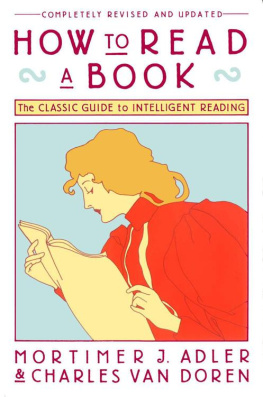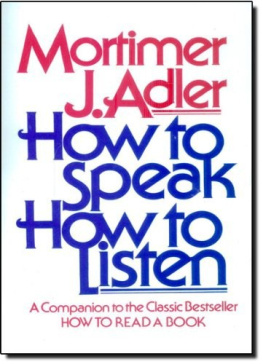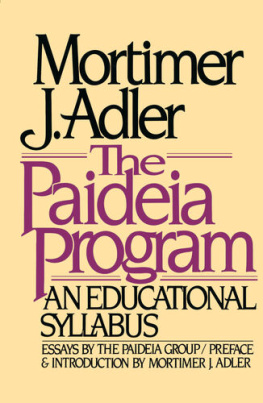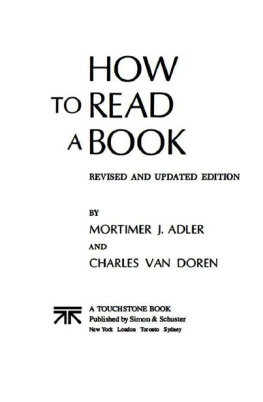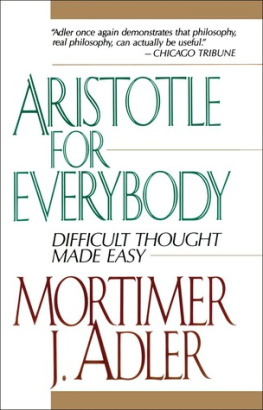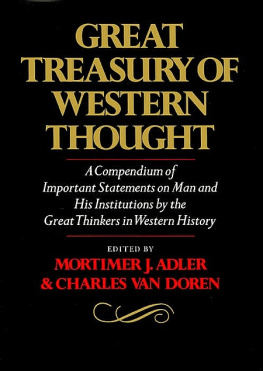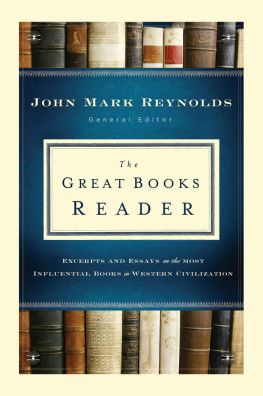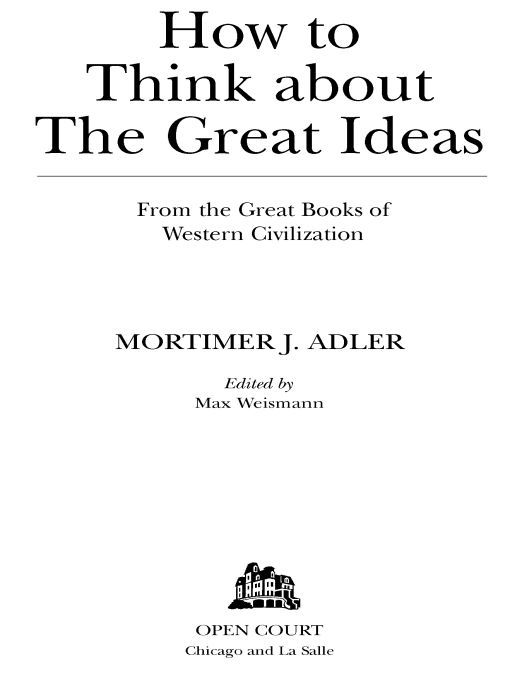Table of Contents
Books by Mortimer Adler
Dialectic (1927) Music Appreciation (1929) The Nature of Judicial Proof (with Jerome Michael, 1931) Crime, Law, and Social Science (with Jerome Michael, 1933) Diagrammatics (with Maude Phelps Hutchins, 1935) Art and Prudence (1937) What Man Has Made of Man (1937) Saint Thomas and the Gentiles (1938) How to Read a Book (1940) The Philosophy and Science of Man (1940) Problems for Thomists: The Problem of Species (1940) Scholasticism and Politics (as editor, 1940) A Dialectic of Morals (1941) How to Think about War and Peace (1944) A Syntopicon: An Index to The Great Ideas (as editor, 2 volumes, 1952) Research on Freedom (2 volumes, 1954) The Idea of Freedom (volume 1, 1958) The Revolution in Education (with Milton Mayer, 1958) The Capitalist Manifesto (with Louis O. Kelso, 1958) The New Capitalists (with Louis O. Kelso, 1961) Great Ideas from the Great Books (1961) The Idea of Freedom (volume 2, 1961) The Great Ideas Today (as editor, with Robert Hutchins, 1961) Gateway to the Great Books (as editor, 10 volumes, with Robert Hutchins, 1963) (The Conditions of Philosophy (1965) The Difference of Man and the Difference It Makes (1967) The Annals of America (as editor, 21 volumes, 1968) The Time of Our Lives (1970) The Common Sense of Politics (1971) Propaedia (as editor, 30 volumes, 1974) The American Testament (with William Gorman, 1975) Some Questions about Language (1976) Philosopher at Large (1977) Reforming Education (1977) Great Treasury of Western Thought (as editor, with Charles Van Doren, 1977) Aristotle for Everybody (1978) How to Think about God (1980) Six Great Ideas (1981) The Angels and Us (1982) (The Paideia Proposal (1982) How to Speak/How to Listen (1983) Paideia Problems and Possibilities (1983) A Vision of the Future (1984) The Paideia Program (with members of the Paideia Group, 1984) Ten Philosophical Mistakes (1985) A Guidebook to Learning (1986) We Hold These Truths (1987) Intellect: Mind over Matter (1990) Truth in Religion (1990) Haves Without Have-Nots (1991) Desires, Right, and Wrong (1991) A Second Look in the Rearview Mirror (1992) The Great Ideas (1992) The Four Dimen-sions of Philosophy (1993) Art, the Arts, and the Great Ideas (1994) Adlers Philosophical Dictionary (1995) How to Think about The Great Ideas (2000)
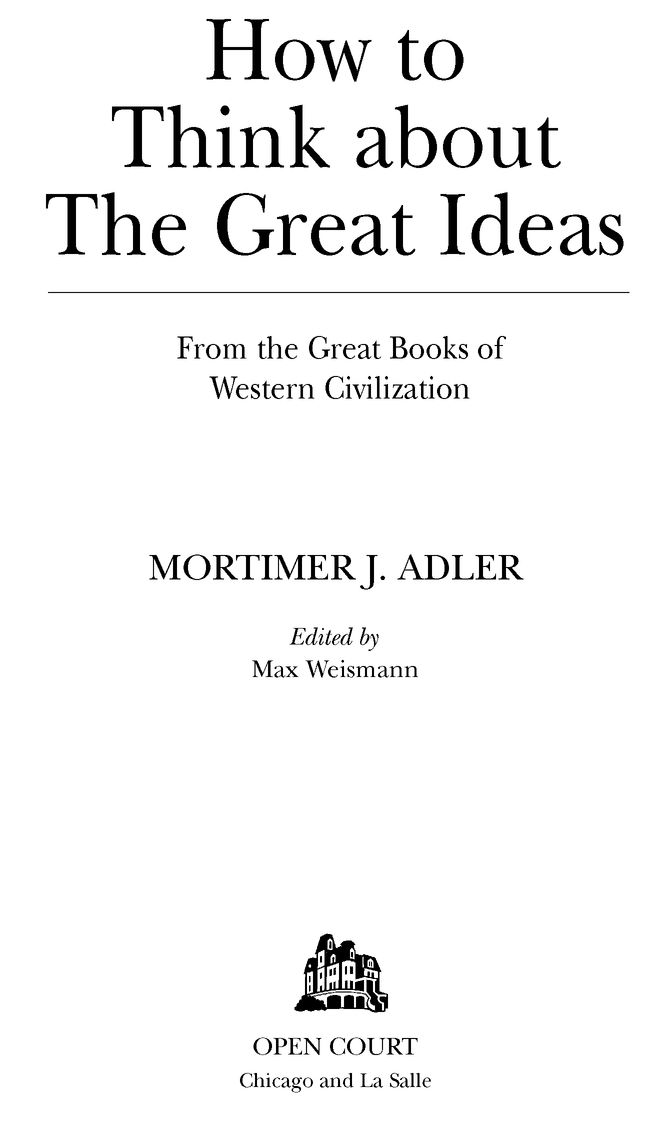
To all the members of the Center for the Study of The Great Ideas
Preface
This book can be read either as an introduction to philosophy or as a thought-provoking treatment of selected philosophical issues by a living master of philosophical education.
No contemporary philosopher has been so extraordinarily successful at encouraging philosophical thought and spreading philosophical knowledge as Mortimer Adler. The 52 chapters of this book are the edited transcripts of Professor Adlers classic TV series, The Great Ideas.
Mortimer Adlers name will always be associated with The Great Ideas and The Great Books. It was Adler who first understood that there are a limited number of Great Ideas which form the core of the thought of Western Civilization and the keys to the Great Books.
Heading a large research staff at the Institute for Philosophical Research, Dr. Adler spent eight years constructing a reference work entitled Syntopicon: An Index to The Great Ideas, a systematic and comprehensive inventory of the fundamental ideas to be found in the Great Books of the Western world. At first, Adlers team listed some seven hundred possible candidates for inclusion among the Great Ideas, but on closer examination over a two-year period most of these turned out to be fragments or portions of more inclusive ideas. These were gradually eliminated, leaving 102 irreducible and indispensable Great Ideas. Over subsequent years, Dr. Adler has found no reason to eliminate any of the 102, and the Great Idea of Equality has been added, making 103.
For his path-breaking TV series on The Great Ideas, Dr. Adler selected 22 Great Ideas which would be most suitable for popular discussion, some of these requiring more than one TV show.
Here are the 103 Great Ideas, with the 22 selected for Adlers TV series listed in bold type:
Angel, Animal, Aristocracy, Art, Astronomy and Cosmology, Beauty, Being, Cause, Chance, Change, Citizen, Constitution, Courage, Custom and Convention, Definition, Democracy, Desire, Dialectic, Duty, Education (Learning), Element, Emotion, Equality, Eternity, Evolution, Experience, Family, Fate, Form, God, Good and Evil, Government, Habit, Happiness, History, Honor, Hypothesis, Idea, Immortality, Induction, Infinity, Judgment, Justice, Knowledge, Labor (Work), Language, Law, Liberty (Freedom), Life and Death, Logic, Love, Man, Mathematics, Matter, Mechanics, Medicine, Memory and Imagination, Metaphysics, Mind, Monarchy, Nature, Necessity and Contingency, Oligarchy, One and Many, Opinion, Opposition, Philosophy, Physics, Pleasure and Pain, Poetry, Principle, Progress, Prophecy, Prudence, Punishment, Quality, Quantity, Reasoning, Relation, Religion, Revolution, Rhetoric, Same and Other, Science, Sense, Sign and Symbol, Sin, Slavery, Soul, Space, State, Temperance, Theology, Time, Truth, Tyranny and Despotism, Universal and Particular, Virtue and Vice, War and Peace, Wealth, Will, Wisdom, World.
All the Great Ideas are recognizably the same as they were in the ancient world; none of them is a modern discovery. The ancient Greeks had a name for all 103 of them.
These ideas have been objects of speculation and enquiry since the beginning of human thought. They are the common stock of the human mind. The vast literature which exists on each Great Idea reflects not only the continuity of human thought about them, but also the wide diversity of opinions to which such thought inevitably gives rise. By learning about The Great Ideas, we discover all the fundamental disagreements--and agreements--of humankind.
Although The Great Ideas are the same as they were a millennium ago, this doesnt mean that there has been nothing new in the world of ideas. On the contrary, most of the Great Ideas have kept on changing and growing in substance and scope. In every epoch, intellectual geniuses, though they have not discovered new Great Ideas, have exposed new facets of the Great Ideas.
Some Great Ideas (like Prophecy or Angel) had a livelier history in antiquity or the Middle Ages than more recently. Others (like Progress or Evolution) have seen an enormous expansion of attention and refinement in modern times. But even these modern ideas were clearly identified in antiquity. The ancients stole all our ideas from us, as Mark Twain wryly observed.
Even more important than the living presence of a Great Idea is its future. Each Great Idea is still imperfectly understood; each is still unfinished business. Mortimer Adler has tried to understand the history of thinking about one after another of the Great Ideas, reading all the major writings on each subject, charting the whole range of different conceptions and theories which outstanding thinkers have advanced with respect to it, and assessing its present significance.


